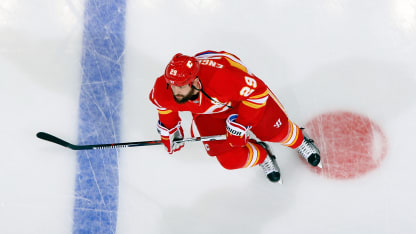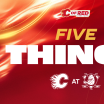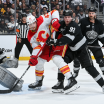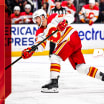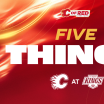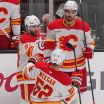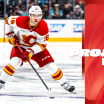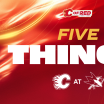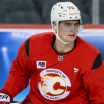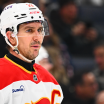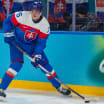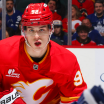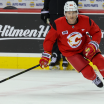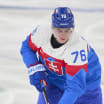There were, at offhand moments, short, piercing stabs of doubt. Had to be.
Times when the well-fortified barricade of self-belief, of stubbornness, of ambition to continue striving, began to fray.
If only ever so slightly.
Going back and working his uncle's farm in advance of starting one of his own was an option. Or maybe train to be a firefighter.
None of those options lasted long, though.
FLAMES EXTRA - STICKING TO IT
Perseverance paid off for Engelland
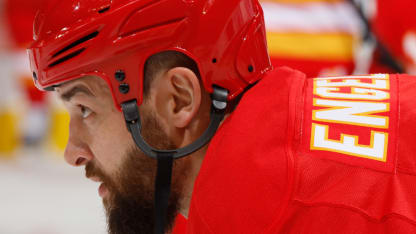
By
GEORGE JOHNSON @GJohnsonFlames / calgaryflames.com
There was always another game to play. Another season to prepare for.
"Quit or keep going? I don't know if I ever had a moment like … that,'' reckons Deryk Engelland, seven seasons and over 400 big-league appearances later.
"Not that cut-and-dried, no.
"Definitely tough times, though. Up and down, East Coast, AHL. Fights. A lot of fights. But I was doing what I loved, I was young, so I battled through the moving around, the disappointment.
"The year before I got my chance, which would've been Year 6, I did begin to wonder whether I might have to make a choice.
"Venture overseas, maybe.
"There were definitely times where I thought 'Okay, I've got to hang on as long as I can' or 'What the hell am I going to do now?'
"But no one ever - at any point - has tried to talk me out of continuing to play. Everyone has been encouraging, the whole way.
"That's meant a lot."
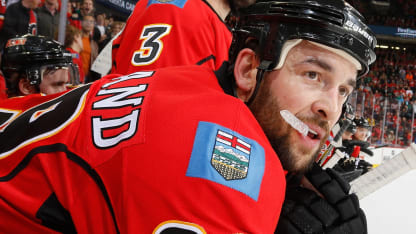
The Deryk Engelland saga represents the ultimate tale of perseverance, of stick-to-itivness.
He's kind of hockey's answer to Rocky Balboa. The guy you can't help but take a shine to. The underdog made good.
Cue the familiar Bill Conti movie theme music.
And in the genesis of then to today, on the final year of a Flames' contract that pays him $2.9 million annually, Engelland will gladly tell you he's had more people in his corner than Sly Stallone.
The Edmonton-born Engelland's dad, Mark, worked as a welder in a sulphur plant in Chetwynd, B.C. and mom Pam now runs a bistro in the local library.
"Still there,'' he says proudly.
"Chipping away.
"I pride myself on putting in the work. My parents instilled that in me. We bought a marina, so my dad was there and on weekends at the mill. Very hard-working guy. And then on top of that, he made time for family, coaching me every single year when I was a kid.
"That kind of commitment definitely rubs off on you.
"Growing up, every guy in here can thank their parents for the hours and money they put in to letting them play. And at that point in time, you're not even sure you'll continue past the minor-hockey level.
"You owe a lot to your family."
There'd be a slew of off-the-hockey-mainstream whistle-stops before Engelland would find his NHL footing: Las Vegas, Lowell, Mass., North Charleston, S.C., Hershey and Reading, Pa., Wilkes Barre/Scranton, Penn.
More than half a dozen winters of traipsing through the minor leagues, 487 games worth of riding buses and shucking the gloves in off-the-beaten tracks rinks in front of meagre crowds.
His unconventional path makes Engelland a favourite of anyone he's played for.
Count among the early admiring mentors Glen Gulutzan, now, of course, his boss at the Scotiabank Saddledome.
Fresh off a blue-collar five-season junior career in the Moose Jaw Warriors' organization, the raw-boned 21-year-old was just searching for any professional embarkation point, a way to stay in the game, when he signed on for the Las Vegas Wranglers - then an affiliate of the Flames - of the East Coast Hockey League in the summer of 2003.
"He was just a kid when I first saw him, fresh out of the Western league,'' recalls Gulutzan. "Not the same Deryk Engelland you see in that room today. Not even remotely.
"Young guy, a little chubby but a really nice kid. And really, reallytough. He started off as our sixth, seventh defenceman in the East Coast League. By the end, boy, he was playing significant minutes and he was fighting men at 20. Big men. Serious guys.
"Kenny Tasker. A real brawler. I've showed the boys here that fight. Keith McCambridge, a tough guy back then.
"So he definitely wasn't shy.
"What was surprising was that Engs could play, too. Skate, shoot, had hockey sense. He wasn't in the greatest shape, like a lot of kids, and he had to work on that. But the raw tools were there, the great person was there. The caring, the wanting, were there, too.
"He just needed to learn to be a pro."
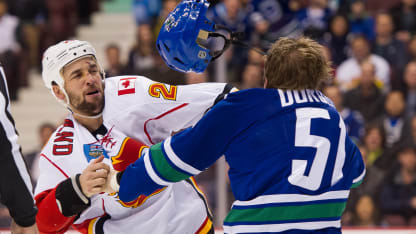
While in Vegas, Engelland hit an out-of-casino jackpot, meeting and marrying wife Melissa. She worked as a cocktail waitress and modelled to help raise the $1,500 a month her hockey-playing hubby needed to hire a personal trainer.
"I wouldn't be here,'' he says with flat finality, "without her. She supported me 100 per cent, right from the time I met her. The first year she probably thought I was a little crazy.
"She took all sorts of jobs, all kinds of hours, to give me whatever freedom I needed to, you know, give it a shot. It was hard on her but to see it pay off, 400-or-whatever-games later, you're still thankful."
Count Todd Reirden - now in his first season upgraded to associate coach to Barry Trotz in Washington after two years as an assistant in D.C. with the Caps - as another key person in the Engelland Evolution.
During their time together in Wilkes Barre/Scranton, top farm club of the Pittsburgh Penguins, Engelland found a role model to follow, an example to emulate.
Both men came out of the mists, undrafted. Both played defence.
And as things played out, each made his NHL debut at the unfashionably late age of 27.
"The fact Deryk knew I'd gone the same route certainly helped,'' says Reirden today. "Played in the East Coast League, as did I. Battled in the American league. So he was able to relate to my path, my experiences, and grasp onto it.
"We had a plan. I told him: 'You've got to get yourself one NHL game.
"'Get that one game and no matter what happens from then on, no one can ever take it from you.'
"We never talked about a long NHL career, the next five years or 10, or anything of that nature. Everything was channeled into that one game, that one chance.
"I believe in short-term goals and re-setting after you've gotten there.
"I remember Deryk packing up after the season. And I told him: 'Let's really try this one summer. Push all your chips in and do everything you possibly can. So at least if this doesn't work out you can say you did everybody possible.'
"I explained to him how I'd done the same thing one summer, made a total commitment, something I'd never done before; how I'd made this many strength gains and cut this much body fat.
"And the next year, I got called up by the Edmonton Oilers.
"I told him: 'This can happen for you. It happened for me. So you have a visual right here. In front of you.'"
That off-season, Engelland trimmed close to 5% of his body fat while maintaining his usual playing weight.
"Right from the start of Pittsburgh's camp, he looked like a totally different guy,'' Reirden recalls with satisfaction. "Just as tough, but quicker. He sent a serious message from the first day, that he was going to do everything in his power to achieve that goal - play one NHL game."
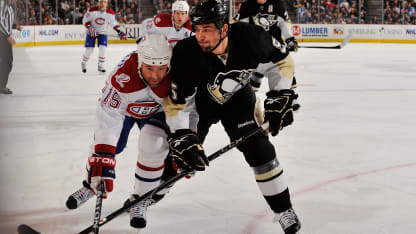
The career debt by a former boss and fast friend will never be forgotten.
"I still remember the conversation,'' Engelland says. "Todd told me: 'We're going to get you one game. One. Then it's up to you.'
"I didn't make the team out of camp, they'd just traded for Martin Skoula, so that was a little disappointing.
"But it happened. Finally. I remember clear as day, (Wilkes Barre/Scanton) played at home, were leaving after the game to play the next night in Worcester. We'd lost. Todd called me in right after the game and I'm like 'Ah, s--, here we go.' I wondered what I'd done wrong.
"I got into his office and he was as excited as I've ever seen anyone.
"He told me: 'Go pack you bag. You're going up. You're getting a car to Philly, then you're playing tomorrow in San Jose, probably.'
"Honestly, I didn't know how to react. I'd waited so long."
The Penguins didn't dress Engelland in the Silicon Valley but three nights later, at TD Garden, on Nov. 10th, 2009, coach Dan Bylsma plugged him in to mark his NHL debut against the Boston Bruins.
"A dream come true. A long time coming. (Kris) Letang got hurt in San Jose, then Brooks Orpik, as I remember correctly, went down early in Boston, so we were down to five D.
"You never want to see anyone hurt but under the circumstances that helped. I didn't have time to think, to worry, sit on the bench.
"I'm pretty sure I played 18 or so minutes that night.
"Got nine games in and that was the summer I really made the changes in working out and my diet.
"And that was the start."
Back in Wilkes Barre/Scranton on the night of the 10th, Todd Reirden felt like popping open a bottle of the bubbly himself.
"To be a part of that, be in a corner and help someone accomplish a lifelong dream,'' he remembers, "is pretty awesome.
"One of the great parts of coaching in the American Hockey League is about the development. If you talk to most coaches at that level, that conversation you have with a player when he's getting called up for the first time is a memorable, memorable moment.
"To see the look in the player's eyes, to know all his sacrifices, his family's sacrifices … well, it's an amazing thing to be a part of."
At the top-flight in Pittsburgh, there were no shortage of examples to emulate.
"I'd have to say Brooks Orpik, a really good friend of mine, would be No. 1,'' reckons Engelland. "I try to pattern my game after his game. He wasn't too much older than me, a year or two. Plays hard, plays physical. Good leader. Obviously there were a lot of guys you could learn from there. Sid (Crosby). Billy Guerin at the time.
"But as a guy to model myself after, pattern my game after, it was definitely Brooks."
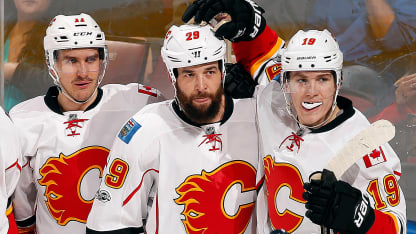
After four seasons in Pennsylvania, Engelland signed a three-year, $8.7 million deal here to add size, steadiness and old-school toughness to the Flames' backend.
"I can remember shaking hands with Engy when they beat us out here," says Gulutzan - then a Canucks' assistant coach - of the first-round Flames-Vancouver post-season series in the spring of 2015.
"We stopped in the line, had a bit of a chat and I told him I was really, really happy for everything that had happened in his career.
"And I meant it.
"Tough night for us, for sure, we'd been knocked out. But you couldn't help but be happy for such a good guy."
Over his nearly three seasons on board here, Engelland's understated contribution has often gone overlooked on a defence corp that boasts Mark Giordano's multi-platform polish, T.J. Brodie's effortless skating stride and Dougie Hamilton's knack for jumping into the play at precisely the right instant. But the big man's solidity, dependability and penalty-killing prowess aren't undervalued by those in the room.
Not too shabby for a someone who was the first cut at his first NHL camp in Pittsburgh, lasting all of three days.
"You don't forget those times,'' admits Engelland. "They help develop you, help you appreciate things. So when I hit 400 games this year, I'm thinking: 'Holy -- …'
"I still feel I have a few years in my tank. Two, three more, that's my goal. Whatever I have do to to accomplish that, I'll do.
"The game's getting faster, younger, so I have to train harder in the summer, take better care of myself. I'm not the most talented guy out there.
"But If there's one thing I've learned it's never to take anything for granted.
"Because I think the moment I sit back and tell myself 'Gee, I've made it' is probably the moment I'll find myself on my way out."
